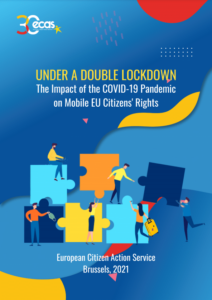
Based on this insight, ECAS has formulated recommendations to stakeholders on the role of civil society in the restoration of freedom of movement and of European citizens’ rights to the status quo ante.
Main Findings
The COVID- 19 pandemic has both magnified the obstacles that mobile EU citizens have been facing in their host countries in recent years and given birth to certain novel concerns. Overall, our research clearly shows that mobile Europeans were disproportionally affected by the pandemic and found it particularly hard to follow the moving target of divergent and constantly changing national rules. Precarious mobile Europeans were hit the hardest, being more likely to experience rising inequality, xenophobia and hate speech during the first wave of the pandemic. Regarding the application and enjoyment of specific rights, EU citizens’ access to healthcare, social benefits and the job market, in addition to their travel, entry and residence rights and fundamental right to family life, have all been put at grave risk as a result of the pandemic. Among the new emergent phenomena that the crisis has brought to the surface, the unintended consequences of cross-border tele-working are, perhaps, the most interesting. The proliferation of remote working practices has found both employees and employers unprepared in terms of their knowledge about the practical and legal repercussions of such work.
The compound effect of all these uncertainties and changes, hurdles and delays, led to what is our most worrisome finding – a deterioration of mobile EU citizens’ mental health since the onset of the crisis reported in over 70% of cases. Everyone has had to endure the crisis, but the pressure placed on those exercising freedom of movement has been particularly high. Separated from both their host communities and their loved ones back home, mobile EU citizens have experienced what we call ‘a double lockdown’.
We did not only ask citizens to report on their predicaments. We invited them to assess the adequacy of both national and EU-level responses to the crisis. Whereas criticism of national measures abounded, mobile EU citizens were all unequivocal in demanding more powers and more coordination at the EU level so that the Union’s response to future similar transnational crises and threats could be up to the task. In relation to the freedom of movement, an overwhelming majority of respondents was surprised to see that it could have collapsed so quickly and ask for a more resilient mobility regime in Europe.
Recommendations
The EU Institutions should safeguard EU citizens’ rights against breaches by ensuring a coordinated response in times of crises ; by acting decisively in cases of violation of freedom of movement and related EU rights and by making resources available for the training of public administrations on EU citizenship rights.
The European Commission should issue a new Communication to the Member States to provide up-to-date guidelines on the Freedom of Movement Directive 2004/38, aiming at overcoming the loopholes in the Directive which result in outcomes that are contrary to its very purpose and which can be at odds with EU citizens’ fundamental rights.
 Access the study and read the full set of recommendations here.
Access the study and read the full set of recommendations here.
The study was carried out with the support of the European Programme for Integration and Migration (EPIM).